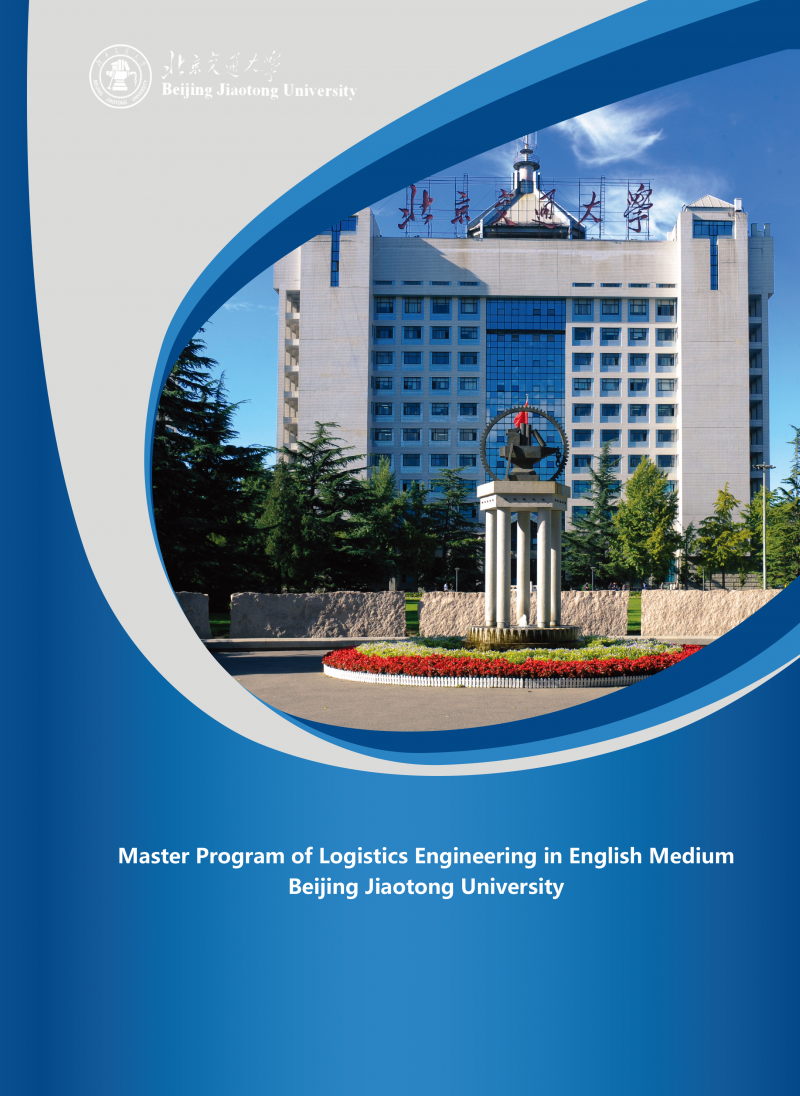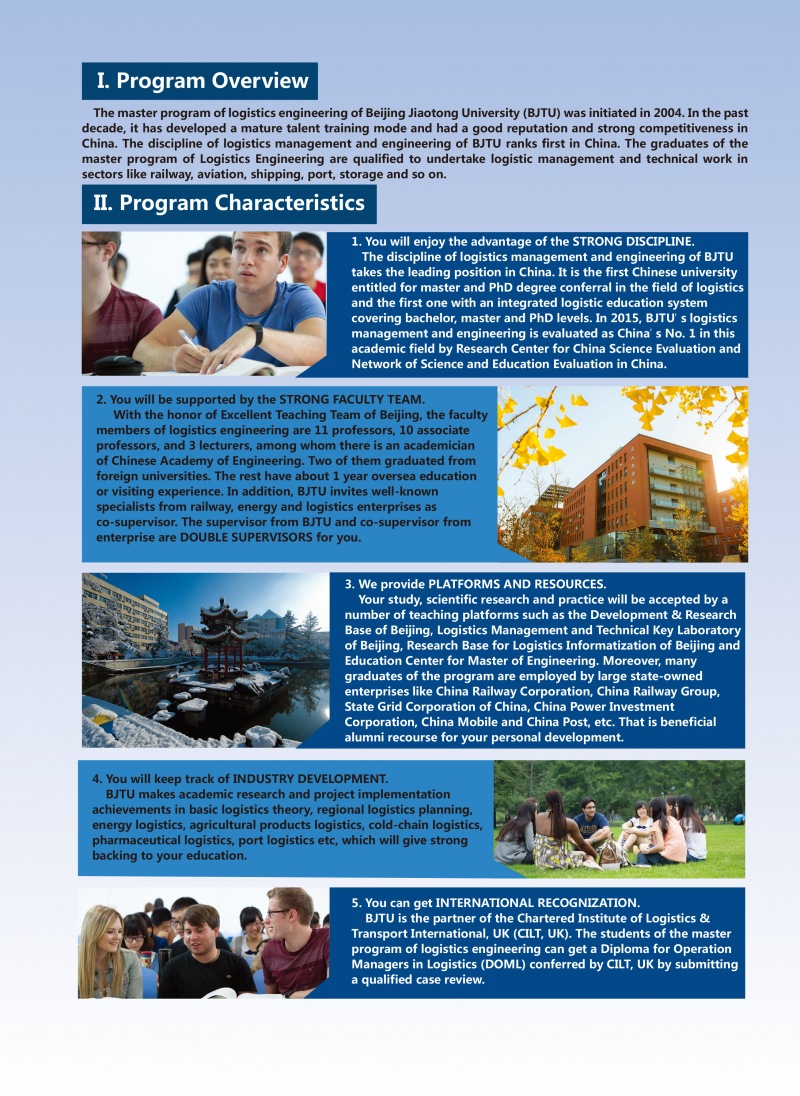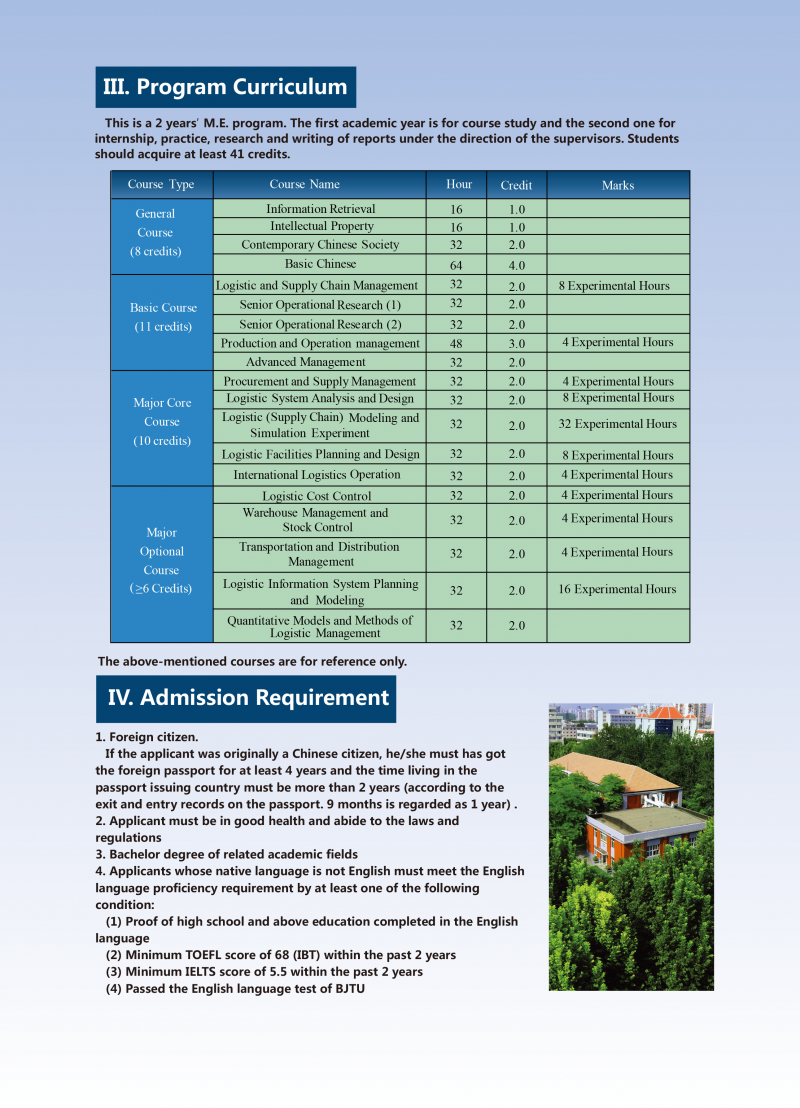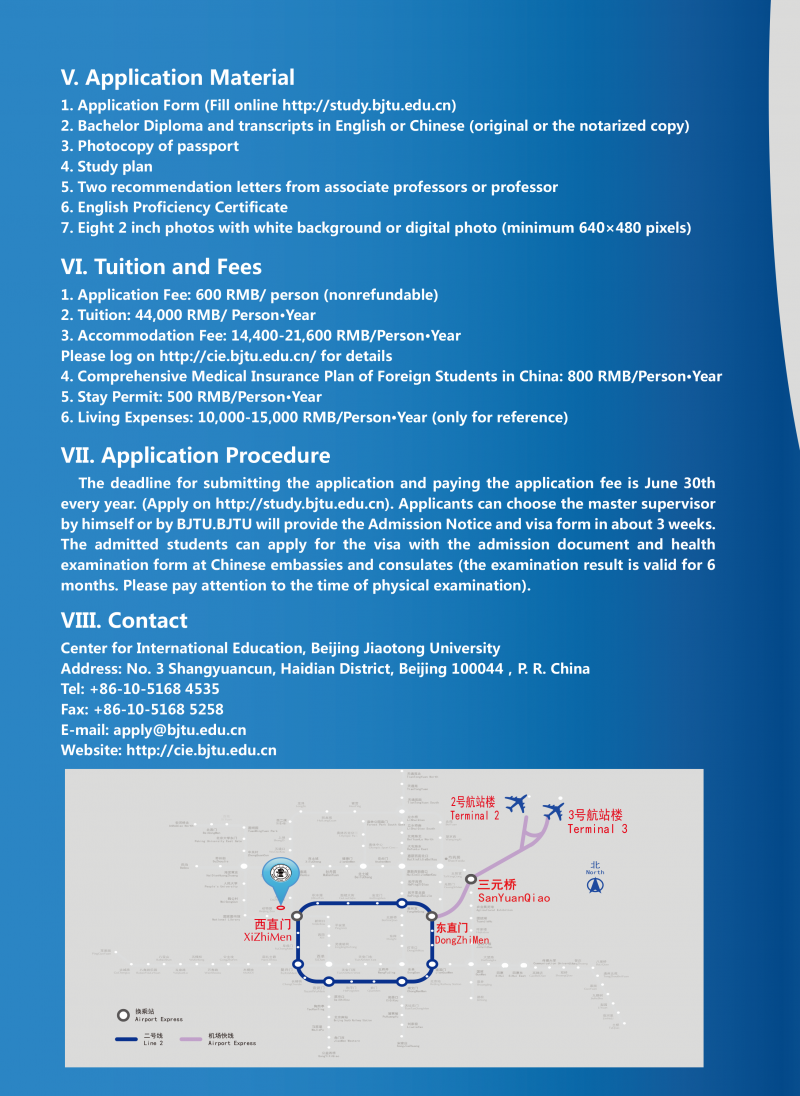Logistics Engineering and Management (Taught in English)
(subject code: 125604, awarded the master's degree in Engineering Management)
1. Major categories and research directions
1.1 Professional fields
Since 1946, Beijing Jiaotong University began to train supply logistics talents for railway enterprises, and took the lead in carrying out logistics management education in China. After more than 70 years of unremitting efforts, the logistics management major of our university is the first in China to form a complete training system of undergraduate, master's and doctor's degree. It has become the first batch of characteristic specialty construction sites of colleges and universities of the Ministry of Education (in 2007). In 2002, its discipline (management science and Engineering) was rated as the key discipline of Beijing, and it has the Beijing Key Laboratory of "logistics management and technology" (2008) Beijing Economic Management Experimental Teaching Demonstration Center (2008) and Beijing off campus talent training base (2010) are the advantages and characteristics of the school, which play a leading and exemplary role for similar majors in China. The teaching team is composed of the first-class teachers of the Yangtze River Municipal Education Committee and the Beijing Municipal teaching team with high-level teachers and teachers.
1.2 Research direction and content
The research directions of MEM in logistics engineering and management include: logistics management engineering; logistics system planning and design; supply chain management and modern logistics.
The specific contents of each research direction are as follows:
1. Logistics management engineering
This research focuses on the analysis of the theory, technology and methods of the logistics management process in the social economic system. Its research is mainly based on the logistics management theory, supply chain management theory and modern management theory and technology. The research content includes the acquisition of material information such as raw materials, From the sale of the finished product to the final consumer, the logistics and supply chain management problems of the entire network of R&D, procurement, manufacturing, sales and other business operations, as well as the solutions and technologies for related problems.
2. Logistics system planning and design
System engineering is an important subject in the field of management science. Logistics system planning and design is to apply the ideas, theories and methods of system engineering to the analysis and design of logistics system. This research focuses on the content, optimization principle, optimization method and application of logistics system optimization; the evaluation method and Realization of logistics system performance; the selection method of logistics system cooperation object.
3. Supply chain management and modern logistics
Comprehensive use of cloud computing, big data, simulation technology and information management theories and methods, tracking the latest technological development, and studying the application and development of modern information technology in the logistics process. Research contents include: smart logistics system planning and management, logistics big data mining, analysis and utilization, machine learning modeling and artificial intelligence applications, logistics information planning, supply chain logistics information integration, digital logistics, and research on logistics information management under e-commerce, etc.
2. Training objectives
This project focuses on cultivating applied and compound international students in the field of logistics engineering and management, with a solid theoretical foundation and broad knowledge in this field, and an understanding of logistics facility applications, system planning, design and evaluation, and advanced technologies and methods of logistics management. Logistics engineering entrepreneurs and senior professional managers who have the strategic ideas and management capabilities of international logistics engineering and meet the needs of international competition.
The specific objectives are as follows:
1. Ideological and moral: Love Chinese culture, respect Chinese laws and moral standards, have a good sense of social responsibility and professional ethics, scientific and rigorous and pragmatic learning attitude and work style, physical and mental health.
2. Academic level: Systematically master the methodology, be good at thinking, be diligent in innovation, widely understand the latest international trends about modern logistics, and be able to scientifically use the latest research results to solve practical problems. Be able to independently carry out business work, teaching work and related scientific research, and have the ability to continue learning, innovation and improvement.
3. Ability level: Be proficient in reading the literature of the subject, have good listening and speaking ability, and be able to conduct international communication. Have a high ability of development and innovation, systematically master the advanced technology and means in this field, be good at solving practical problems, and have strong leadership and decision-making ability.
4. Achievement level: Have good academic ethics and innovation ability, be able to complete dissertation independently and reach the level of professional master's degree thesis.
5. Career development direction: Serving the government administrative departments: engaged in modern logistics industry development planning, urban or regional logistics infrastructure planning, urban or regional logistics information platform planning, formulating logistics industry development policies, etc.
Service for production enterprises or other logistics demand enterprises: engaged in logistics strategic planning and management, logistics scheme design of enterprise 3 industry, planning, organization and control of supply chain.
Serving logistics enterprises: engaged in logistics enterprise development planning, logistics enterprise operation and management, logistics system planning and design, logistics solution design, logistics project management, transportation planning, inventory planning, international logistics management, etc.
3. Training mode and length of schooling
1. Training mode
Taking full-time learning mode and combining curriculum learning, professional practice and dissertation training mode, curriculum learning, professional practice and dissertation are equally important, which is an important support for the future career development potential of graduate students.
Double tutor system is adopted for graduate students. One tutor is from the school, and the other is an enterprise expert with senior professional title or other technical experts with rich practical engineering experience and strong sense of responsibility.
2. Length of schooling
The basic length of study is 2 years, and the longest is 4 years.
4. Scientific research and Practice
Professional practice is an important link for graduate students to gain practical experience and improve their practical ability. The MEM graduate students in the field of logistics engineering and management can carry out the professional practice by combining centralized practice and segmented practice for at least one year to cultivate the necessary engineering and management skills and literacy, and complete the whole process management and guidance of the instructor. The college implements the assessment system for professional practice, and the assessment time is arranged in the third semester and organized by the college.
Actively use social resources to establish joint training base for graduate students with enterprises and institutions, encourage the use of joint training mode, take the engineering and management practice problems encountered in students' professional practice as the topic of the thesis, and use the professional knowledge to solve the practical problems of enterprises and institutions.
In the process of postgraduate training, we should pay equal attention to scientific research and practice, and encourage postgraduates to actively participate in the logistics research projects presided over by internal and external tutors, so as to improve students' scientific research and practical ability.
5. Dissertation
Scientific research and dissertation writing is the main way to train graduate students' scientific research ability and cultivate their innovation ability. It is also one of the important basis to judge whether graduate students can obtain a degree. They are required to complete 4 corresponding thesis links, and the specific contents and requirements should refer to the documents of graduate school and college. The thesis is written in English, including the following aspects:
5.1 opening report
The opening of the thesis is generally organized by the College (discipline), and the latest time to apply for oral defense is no less than half a year. The opening report is organized by the college in a unified and centralized way. It is generally arranged at the beginning of the third semester, and it is not less than half a year from the date of application for defense at the latest.
The opening report consists of three parts: (1) the background and significance of the topic; (2) the previous work, the work prepared and the expected research results; (3) the research schedule.
The assessment team conducts full discussion and evaluation based on the scientific and feasibility of the students' report and topic selection, points out the key technologies and problems, helps students to rationally optimize the content and key points of the paper, and finally gives a correct evaluation of their comprehensive ability and level.
5.2 Professional practice assessment
Professional degree postgraduates are required to have no less than 6 months of enterprise practice, the implementation of professional practice assessment system. The assessment time should be arranged at the end of the third semester or the beginning of the fourth semester.
5.3 Thesis defense and other links and requirements
Students can apply for thesis defense only after they have completed all the links specified in the training program, obtained the credits specified in the training program and passed the examination.
The evaluation of dissertations should focus on the following aspects: the author's ability to solve engineering and technical problems by using scientific theories, methods and technical means; the technical difficulty and workload of thesis work; the new ideas, new methods and new progress in solving practical problems in logistics engineering and management field.
After receiving the opinions of the instructor and at least two reviewers, the official defense can be conducted. The Defense Committee of master's thesis in logistics engineering and management is composed of five experts with senior professional titles in logistics engineering and related engineering application fields. After the thesis of logistics engineering and management is approved, the relevant materials will be submitted to the degree evaluation committee.
5.4 Writing requirements
Please refer to the template for the paper format.
5.5 Oral defense
Graduate students can apply for thesis defense only after completing the required links in the training program, the course learning meets the requirements of the training program, and the grades are qualified, and the dissertation has been reviewed and approved.
In addition to the detailed comments written by the tutor, the dissertation should also be reviewed by two experts in the field or similar fields. The dissertation defense committee is composed of five experts with senior professional titles related to the field. Both the reviewers and the members of the defense committee should have experts in the relevant engineering field.
5.6 Paper form
The essay should include the comparison, evaluation, design or analysis of related programs, and complete related documents. It can be a logistics system planning and design project, which must have technical and economic comparisons and corresponding technical documents; it can be the design of a new process or new method, and it must have all the technical data and analysis of the design; it can be the design and analysis of a logistics information system Development requires systematic related technical documents and related software; it can be the result of logistics management, must apply advanced management theories and methods, and have an analysis of implementation effects.
6. Other requirements
Other relevant requirements shall be implemented in accordance with the relevant regulations of graduate schools and colleges.
7. Course Setting and Credit Requirements
The credits of graduate students are divided into course credits and practice and thesis credits. The course credits are divided into three platform courses: quality improvement platform, ability improvement platform and professional further education platform; practice and thesis link credits include dissertation opening report, academic regular meeting, professional practice and other training links.
1.Credit requirements
The credit system is implemented in the course study, and the total credit should reach 42 credits.
2. Curriculum
This project is taught in English. See the attached table for specific courses.
3. Teaching form
According to the characteristics of professional degree postgraduate education, there are two kinds of teaching methods: on campus teachers and off campus teachers. Employ outside senior technical title experts or middle and senior management personnel with practical experience to give lectures or lectures. Highlight case analysis and practical research. In the teaching process, team learning, case analysis, field research, simulation training and other methods are used to form a teaching mode combining classroom teaching, special lecture and entrepreneur forum. The teaching content should be broad and comprehensive, reflect the forefront of scientific and technological development, and pay attention to cultivating students' awareness and ability to study practical problems. The specific curriculum and credit requirements are as follows:
*Slide around to see more
|
Course category
|
Course module
|
Course name
|
Course number
|
Is it compulsory
|
Credit
|
Semester
|
Credit requirement
|
|
Quality promotion platform
|
National conditions education courses
|
China Panorama
|
A228001B
|
Compulsory
|
2
|
Autumn/Spring
|
3
|
|
Contemporary Chinese Society(English)
|
A228003B
|
Elective
|
pick one of two
|
Autumn
|
|
Chinese Culture
|
A228002B
|
Elective
|
Autumn/Spring
|
|
Comprehensive literacy course
|
Innovation and entrepreneurship practice
|
M503230B
|
Limited selection
|
2
|
Autumn/Spring
|
1
|
|
Information retrieval
|
A226001B
|
(Note 1)
|
1
|
Autumn/Spring
|
|
Engineering ethics
|
A203005B
|
|
2
|
Spring
|
3
|
|
Cross-cultural communication and management
|
A203006B
|
|
1
|
Autumn
|
|
Comprehensive literacy practice
|
See "Guiding Opinions on Comprehensive Literacy Practice Module for Graduate Students"
|
H203011B
|
Compulsory (Note 2)
|
1
|
|
1
|
|
Capacity improvement platform
|
Language Ability Module
|
Research methods and essay writing
|
C403015B
|
Compulsory
|
1
|
Spring
|
4
|
|
Elementary Chinese
|
C428001B
|
Compulsory
|
3
|
Autumn/Spring
|
|
Math Ability Module
|
Operations Research (1)
|
C403022B
|
Compulsory
|
2
|
Autumn
|
4
|
|
Operations Research (2)
|
C403023B
|
Compulsory
|
2
|
Autumn
|
|
Information Capability Module
|
Logistics Information System Planning Modeling
|
M503248B
|
Compulsory
|
2
|
Autumn
|
≥2
|
|
Supply chain and blockchain
|
M503051B
|
Compulsory
|
2
|
Autumn
|
|
Professional further education platform
|
Core subject
|
Advanced Management
|
M503121B
|
Compulsory
|
2
|
Autumn
|
≥13
|
|
Logistics and supply chain management
|
M503235B
|
Compulsory
|
2
|
Autumn/Spring
|
|
Logistics system analysis and design
|
M503072B
|
Compulsory
|
2
|
Autumn
|
|
Logistics (supply chain) modeling and simulation experiment
|
M503226B
|
Compulsory
|
2
|
Autumn/Spring
|
|
Production operation management
|
M503221B
|
Compulsory
|
3
|
Autumn
|
Purchase management decision
|
M503042B
|
Compulsory
|
2
|
Spring
|
|
Logistics facility planning and design
|
M503241B
|
Compulsory
|
2
|
Autumn/Spring
|
|
International logistics operations
|
M503239B
|
Compulsory
|
2
|
Autumn/Spring
|
|
Professional Development Course
|
Warehouse planning and management
|
M503050B
|
Elective
|
2
|
Autumn
|
≥4
|
|
Cargo transportation planning and management
|
M503052B
|
Elective
|
2
|
Spring
|
|
Logistics cost control
|
M503137B
|
Elective
|
2
|
Spring
|
|
Quantitative models and methods of logistics management
|
M503138B
|
Elective
|
2
|
Spring
|
|
Professional repair
|
Undergraduate courses in this major, no credits
|
|
Elective (Note 4)
|
0
|
Determined by tutor or college
|
|
Academic and practical innovation platform
|
Regular academic meeting
|
|
H203001B
|
必修
|
1
|
|
7
|
|
Opening report
|
|
H203003B
|
1
|
|
|
Thesis mid-term inspection
|
|
H203020B
|
0
|
|
|
Professional Practice
|
Professional internship for 6 months
|
H203006B
|
5
|
|
*Slide around to see more
Note appended:
1. Humanities and scientific quality courses: including humanities quality courses, scientific research skills courses, academic norms and professional ethics courses, mental health and safety education courses, and scientific ethics education courses needed for the improvement of talents' quality in the research field, which are respectively set up by each college, and the Graduate School selects the published course list with good effect for each college to choose.
Among them, "innovation and entrepreneurship credit" shall not exceed 1 credit, including innovation and Entrepreneurship (including science and technology competition), social practice, innovation and entrepreneurship workshop, future leader plan, etc.
2. The tutors and graduate students choose courses offered throughout the school according to their own learning needs.
3. There are no less than 12 leading-edge lectures.
4. The requirements of literature review: literature review should include the summary of Chinese and foreign literature, reading experience and thinking caused by it. The literature review must be related to the topic of the paper. In addition to the classic literature, it must be the papers published in public academic journals or international conferences in recent five years, with no less than 30 literatures and no less than 5 English literatures.













